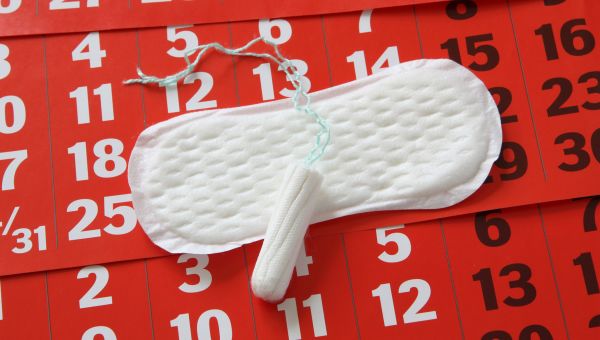6 gynecological symptoms you shouldn't ignore
While some vaginal issues are perfectly ordinary, others need medical attention. Here’s why.
Updated on August 23, 2023

Your vagina and other reproductive organs change throughout the course of your life—they can even change throughout the course of the month—and there can sometimes be new and perplexing symptoms. There is often a harmless explanation for these changes. But when pain, bloating, bleeding, or other symptoms are new, different or become persistent, they could be a sign that… Show More
Your vagina and other reproductive organs change throughout the course of your life—they can even change throughout the course of the month—and there can sometimes be new and perplexing symptoms. There is often a harmless explanation for these changes. But when pain, bloating, bleeding, or other symptoms are new, different or become persistent, they could be a sign that you should see your healthcare provider (HCP). Having these symptoms evaluated as soon as possible is critical to starting treatments early, when certain conditions may be more treatable.
Read on to learn about some common gynecological symptoms—and when they may require medical attention.
Show Less
Bloating and Pelvic Pain
Occasional bloating may be the result of constipation, drinking carbonated beverages, or developing gas after eating certain foods. But if you’re unable to find the source of your symptoms, you should make an appointment to see an HCP.
That’s because bloating can sometimes be a symptom of a food… Show More
Occasional bloating may be the result of constipation, drinking carbonated beverages, or developing gas after eating certain foods. But if you’re unable to find the source of your symptoms, you should make an appointment to see an HCP.
That’s because bloating can sometimes be a symptom of a food intolerance, irritable bowel syndrome, or even an ovarian tumor or ovarian cancer, says Renee Cotter, MD, an OBGYN with West Hills Hospital and Medical Center in West Hills, California.
You should also speak with an HCP if you’re experiencing bloating with pelvic pain. This duo could signal another gynecological condition or a GI issue such as diverticulitis, Dr. Cotter adds.
Show Less
Irregular Bleeding
A single episode of spotting doesn’t necessarily spell trouble, but if it’s a “heavy, persistent, prolonged, or painful problem” you should have it checked out, says Cotter. Your HCP may perform an ultrasound and a Pap test, look for polyps in the cervix and uterus, and run lab tests to check for… Show More
A single episode of spotting doesn’t necessarily spell trouble, but if it’s a “heavy, persistent, prolonged, or painful problem” you should have it checked out, says Cotter. Your HCP may perform an ultrasound and a Pap test, look for polyps in the cervix and uterus, and run lab tests to check for hormone issues.
In particular, bleeding is a concern if you’ve stopped having periods due to menopause, Cotter explains. So if you are postmenopausal (have not menstruated for 12 months in a row) and are experiencing vaginal bleeding, you should make an appointment with an HCP as soon as possible. “Our first concern is to rule out cancer,” she says. Your HCP will examine you for cervical and endometrial (uterine) cancer, as well as endometrial or cervical polyps and other irregularities.
Show Less
Discharge
Everyone with a vagina will have some discharge, says Cotter; it varies based on your age and method of birth control:
- If you are not on birth control and still ovulating, discharge should have “the consistency of a raw egg white” before and at ovulation and become “thick, smooth, and white” after … Show More
Everyone with a vagina will have some discharge, says Cotter; it varies based on your age and method of birth control:
- If you are not on birth control and still ovulating, discharge should have “the consistency of a raw egg white” before and at ovulation and become “thick, smooth, and white” after ovulation, she notes.
- If you are on combination oral contraceptives (containing both estrogen and a progestin), you will likely have a thick, white discharge all month long.
- If you have an IUD, you'll have a slightly heavier discharge.
- If you are menopausal and not on hormone replacement therapy, you may experience “atrophic vaginitis, which causes a yellow-mustardy discharge” or little discharge at all.
Talk to your HCP if discharge has an unusual color or smell, or if it is painful or itchy.
Show Less
Frequent Urination
Having to run to the bathroom to urinate frequently is a very common concern, says Cotter. Although drinking too many beverages with caffeine or alcohol may cause anyone to urinate more often, overactive bladder (OAB) could also be the cause.
When someone has OAB, their urge to go is so strong that… Show More
Having to run to the bathroom to urinate frequently is a very common concern, says Cotter. Although drinking too many beverages with caffeine or alcohol may cause anyone to urinate more often, overactive bladder (OAB) could also be the cause.
When someone has OAB, their urge to go is so strong that they may have an accident before reaching the toilet. Stimuli like the sound of running water or a shower may also cause accidents, Cotter says.
On the other hand, constantly feeling the need to pee could indicate a urinary tract infection (UTI), while an increase in frequency may be a sign of diabetes or fibroids. Bottom line: Talk to your HCP if you have the urge to go more often than usual.
Show Less
Itching
A persistent itch in the vaginal and vulvar area may indicate a yeast infection. Common triggers include certain antibiotics, eating too much sugar, and hormonal conditions. Yeast infections may cause a “cottage cheese-like discharge that is usually white,” says Cotter, although sometimes it may be… Show More
A persistent itch in the vaginal and vulvar area may indicate a yeast infection. Common triggers include certain antibiotics, eating too much sugar, and hormonal conditions. Yeast infections may cause a “cottage cheese-like discharge that is usually white,” says Cotter, although sometimes it may be watery and clear. Over-the-counter medications or a prescribed, single-dose pill (fluconazole) can typically treat the infection.
Itching accompanied by a burning sensation could signal bacterial vaginosis, which causes a thin white or gray discharge that has a strong fishy odor, particularly after sex; these symptoms should be discussed with your HCP.
Some other causes of itching may include the following:
- Skin conditions such as contact dermatitis, caused by soaps or fabrics that irritate your skin
- Bartholin glands cysts, which develop in the glands near the opening of the vagina; these glands help you stay lubricated during sexual activity.
- Vulvodynia, which is pain and itching around the vagina and vulva
- Genitourinary symptoms of menopause, which include the thinning of the lining of the walls of the vagina, caused by decreasing levels of estrogen
- Sexually transmitted infections, such as trichomoniasis (which is also often marked by yellow-gray or green discharge with a fishy odor)
- Sweating caused by tight-fitting clothing
If you have vaginal or vulvar itching and have previously been diagnosed with human papilloma virus (HPV), you should see an HCP; it could be a symptom of vulvar cancer.
Show Less
Pelvic Pain
Cramps may be typical during your period, but persistent or severe pelvic pain could be a symptom of several conditions, including endometriosis. This occurs when the tissue that forms the lining of the uterus grows outside of the uterus. That extra lining may lead to growths and cysts on your… Show More
Cramps may be typical during your period, but persistent or severe pelvic pain could be a symptom of several conditions, including endometriosis. This occurs when the tissue that forms the lining of the uterus grows outside of the uterus. That extra lining may lead to growths and cysts on your ovaries, or you may develop scar tissue.
Other reasons you may have pelvic pain include adenomyosis (when tissue lining the uterus grows into the uterine wall), pelvic inflammatory disease (PID), ovarian cysts, or uterine fibroids, Cotter says. Your HCP may also want to check for ovarian and uterine cancer.
Visit your HCP right away if you're bleeding heavily, if you have sudden, extreme pain along with foul-smelling vaginal discharge or fever, or if you’re more than a week late. Having pain before your period or after your period has ended warrants a consultation, as well. A pelvic exam, ultrasound, hysteroscopy, or biopsy can help pinpoint the trigger. Hormonal treatments can help improve symptoms if bleeding is a result of ovulation issues, fibroids, or endometriosis. The earlier you get these symptoms checked out, the sooner you can start treatment to feel better.
Show Less
Moffitt Cancer Center. Why Does Ovarian Cancer Cause Bloating? Accessed August 14, 2022.
American College of Obstetricians and Gynecologists. Bleeding After Menopause Could Be a Problem. Here's What to Know. Updated October 2020.
Cleveland Clinic. Cervical Mucus. Last reviewed October 14, 2021.
Mayo Clinic. Estrogen And Progestin Oral Contraceptives (Oral Route). Last updated February 1, 2022.
Mayo Clinic. Vaginal atrophy. September 17, 2021.
Office on Women’s Health. Vaginal yeast infections. Page last updated: February 22, 2021.
Centers for Disease Control and Prevention. Bacterial Vaginosis – CDC Basic Fact Sheet. Page last reviewed: January 5, 2022.
American College of Obstetricians and Gynecologists. Disorders of the Vulva: Common Causes of Vulvar Pain, Burning, and Itching. Last reviewed November 2020.
American College of Obstetricians and Gynecologists. Vaginitis. Frequently Asked Questions. Last reviewed July 2021.
Cleveland Clinic. Sexual Health: Genital Itching. Last reviewed January 7, 2021.
American Cancer Society. Signs and Symptoms of Vulvar Cancers and Pre-Cancers. Last Revised: January 16, 2018.
Mayo Clinic. Adenomyosis. June 18, 2022.
Cleveland Clinic. Bloated Stomach. Last reviewed September 10, 2021.
More On


video

article

slideshow


video


video
